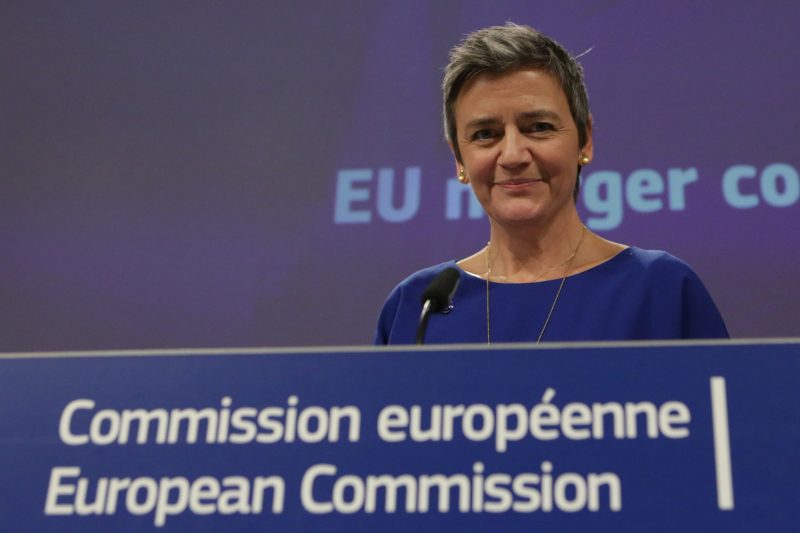EU giant-slayer turns fire on France and Germany
The EU’s anti-trust chief Margrethe Vestager has gained a reputation as a champion of critics of Silicon Valley (Aris Oikonomou)
Brussels (AFP) – Her tough stance towards US firms earned her the ire of President Donald Trump, but the EU’s anti-trust chief Margrethe Vestager has now drawn the fury of powerful Europeans.
Google, Apple, Facebook: It was all very well to take on Silicon Valley’s major players, but on Wednesday the Danish former minister opposed Paris and Berlin, slapping her veto on merging the rail businesses of Siemens and Alstom.
Debates over a merger rarely spill into the public but with the Siemens-Alstom tie-up, Germany and especially France lobbied hard to sway Brussels towards a green light.
But Vestager has now left top ministers with egg on their face and quickly found herself on the receiving end of angry opprobrium by officials.
Vestager’s take on competition is “extravagant” and “an extremely dated conception of law”, thundered French Prime Minister Edouard Philippe to MPs.
Unruffled as ever, Vestager, 50, took a typically exact approach when asked about the headwinds against her at a press conference on Wednesday.
The daughter of a Lutheran pastor, Vestager made clear that the influence of the EU’s most powerful would not stray her from the law.
While the interest “has been very high for France and Germany … there are still another 26 EU member states” and “customers all over Europe.”
The commission, guardian of EU law, must ensure that “not only those who are very vocal, (including) in the media, are being heard,” she said.
– ‘Hugely respected’ –
Until Wednesday, Vestager was best known for delivering mega fines against Silicon Valley giant Google or ordering back taxes to be paid by Apple and Amazon.
Such was her high profile that Trump reportedly told Vestager’s boss, European Commission chief Jean-Claude Juncker, that “Your tax lady… she really hates the US.”
The gigantic 13 billion euros that she ordered Apple to pay in back taxes to Ireland in 2016 grabbed headlines worldwide, as she gained a reputation as a champion of critics of Silicon Valley.
Despite her thunderbolts, Vestager is known in Brussels for infusing one of the EU’s most feared positions with a much-needed dose of humanity.
Her vast, bright office in the commission’s Berlaymont headquarters is covered with photos of her three daughters, with a small desk that resembles more of a workstation.
Vestager was at one time best known for inspiring her country’s hit television political drama “Borgen” about an ambitious female politician who becomes prime minister.
She developed a taste for Europe’s potential when she was the Danish economy minister, chairing meetings with her colleagues during the grim depths of the eurozone debt crisis.
In an interview in November with AFP, Vestager spoke of her anti-trust portfolio matter-of-factly but perked up to talk about Europe, which she said must wake up and re-engage its citizens, especially ahead of European elections in May.
“For many people, Europe is a promise that needs to be renewed because for some people it was not fulfilled,” she said.
“I think what is more important now is that people vote for parties who would actually work for a Europe that delivers,” she said.
Vestager already seemed in campaign mode, though her ability to win the backing of France and Germany for a higher role in Brussels will have been endangered by Wednesday’s merger veto.
At the time, she said her ambition was to re-up for another five years as competition commissioner as her work was “not done” with her mandate over in October.
But this remains an unlikely prospect because her tiny party is out of power in Denmark and its prospects bleak in upcoming elections.
– ‘Margrethe III’ –
Vestager has brought a huge change to the grey and insular world of antitrust competition law and said there remains a lot of work to do.
Avoiding legal jargon and weighty opinions, Vestager insists on an everyman approach to anti-trust issues, focusing on consumers.
It is this desire to always think of the voter and headlines that bothers her critics who see Vestager as too political for the anti-trust portfolio.
“I’m not very much in the mood of summing up my five years, but more in the mood of saying this is what we learned so far, now how we can push it further,” she told AFP.
Sometimes nicknamed back home as “Margrethe III,” an allusion to Denmark’s Queen Margrethe II, she became minister in 1998, named at 29 to the education and ecclesiastical affairs portfolio, and over the years rose up the ranks.
Disclaimer: This story is published from a syndicated feed. Siliconeer does not assume any liability for the above story. Validity of the above story is for 7 Days from original date of publishing. Content copyright AFP.


